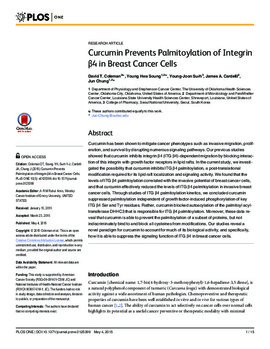| dc.contributor.author | David T. Coleman | |
| dc.contributor.author | Young Hwa Soung | |
| dc.contributor.author | Young-Joon Surh | |
| dc.contributor.author | James A. Cardelli | |
| dc.contributor.author | Jun Chung | |
| dc.date.accessioned | 2017-03-05T22:54:53Z | |
| dc.date.available | 2017-03-05T22:54:53Z | |
| dc.date.issued | 2015-05-04 | |
| dc.identifier.citation | Coleman DT, Soung YH, Surh Y-J, Cardelli JA, Chung J (2015) Curcumin Prevents Palmitoylation of Integrin β4 in Breast Cancer Cells. PLoS ONE 10(5): e0125399. doi:10.1371/journal.pone.0125399 | en_US |
| dc.identifier.uri | https://hdl.handle.net/11244/49258 | |
| dc.description | We thank Dr. Tak yee Aw for technical assistance and critical discussion of the manuscript. This study is supported by American Cancer Society (RSG-09-091-01-CSM: JC) and NIH-NCI (R01CA163657-01A1: JC). | en_US |
| dc.description | | en_US |
| dc.description.abstract | Curcumin has been shown to mitigate cancer phenotypes such as invasive migration, proliferation, and survival by disrupting numerous signaling pathways. Our previous studies showed that curcumin inhibits integrin β4 (ITG β4)-dependent migration by blocking interaction of this integrin with growth factor receptors in lipid rafts. In the current study, we investigated the possibility that curcumin inhibits ITG β4 palmitoylation, a post-translational modification required for its lipid raft localization and signaling activity. We found that the levels of ITG β4 palmitoylation correlated with the invasive potential of breast cancer cells, and that curcumin effectively reduced the levels of ITG β4 palmitoylation in invasive breast cancer cells. Through studies of ITG β4 palmitoylation kinetics, we concluded curcumin suppressed palmitoylation independent of growth factor-induced phosphorylation of key ITG β4 Ser and Tyr residues. Rather, curcumin blocked autoacylation of the palmitoyl acyltransferase DHHC3 that is responsible for ITG β4 palmitoylation. Moreover, these data reveal that curcumin is able to prevent the palmitoylation of a subset of proteins, but not indiscriminately bind to and block all cysteines from modifications. Our studies reveal a novel paradigm for curcumin to account for much of its biological activity, and specifically, how it is able to suppress the signaling function of ITG β4 in breast cancer cells. | en_US |
| dc.language.iso | en_US | en_US |
| dc.publisher | PLos One | |
| dc.relation.ispartofseries | PLoS ONE 10(5): e0125399 | |
| dc.relation.uri | http://www.plosone.org/article/info%3Adoi%2F10.1371%2Fjournal.pone.0125399 | |
| dc.rights | Attribution 3.0 United States | |
| dc.rights.uri | https://creativecommons.org/licenses/by/3.0/us/ | |
| dc.subject | Palmitoylation,Cysteine,Phosphorylation,Breast cancer,Integrins,Signal inhibition,Growth factors,Chemistry | en_US |
| dc.title | Curcumin Prevents Palmitoylation of Integrin β4 in Breast Cancer Cells | en_US |
| dc.type | Research Article | en_US |
| dc.description.peerreview | Yes | en_US |
| dc.description.peerreviewnotes | http://www.plosone.org/static/editorial#peer | en_US |
| dc.identifier.doi | 10.1371/journal.pone.0125399 | en_US |
| dc.rights.requestable | false | en_US |

